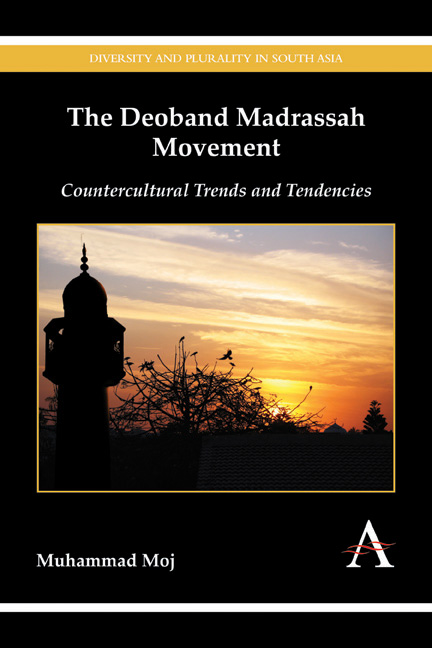Book contents
- Frontmatter
- Dedication
- Contents
- Preface
- Prologue
- Chapter 1 The Deoband Madrassah Movement: Research Context
- Chapter 2 Origin of the DMM: Seeds of a Counterculture
- Chapter 3 The DMM in United India: Activist Countercultural Trends
- Chapter 4 The DMM in Pakistan: Countercultural Politics and Extremism
- Chapter 5 Deobandi Islam: Countering Folk Islam and Popular Custom
- Chapter 6 The DMM versus Mainstream Society: Viewpoints of Deobandi Journals and Students
- Epilogue
- Appendix I The Deobandi Stance vis-à-vis Muslim Groups other than the Barelwis
- Appendix II Countercultural Exposition of the Deobandi Taliban
- Appendix III Interview Guide
- Glossary of Islamic Terms
- References
- Index
Appendix I - The Deobandi Stance vis-à-vis Muslim Groups other than the Barelwis
Published online by Cambridge University Press: 05 December 2015
- Frontmatter
- Dedication
- Contents
- Preface
- Prologue
- Chapter 1 The Deoband Madrassah Movement: Research Context
- Chapter 2 Origin of the DMM: Seeds of a Counterculture
- Chapter 3 The DMM in United India: Activist Countercultural Trends
- Chapter 4 The DMM in Pakistan: Countercultural Politics and Extremism
- Chapter 5 Deobandi Islam: Countering Folk Islam and Popular Custom
- Chapter 6 The DMM versus Mainstream Society: Viewpoints of Deobandi Journals and Students
- Epilogue
- Appendix I The Deobandi Stance vis-à-vis Muslim Groups other than the Barelwis
- Appendix II Countercultural Exposition of the Deobandi Taliban
- Appendix III Interview Guide
- Glossary of Islamic Terms
- References
- Index
Summary
It is interesting to note that the DMM has not only condemned the Barelwi sect, which both represents the largest proportion of Pakistani Muslims (more than 60 per cent) and defends the beliefs and practices of millions of followers of folk Islam who claim not to belong to any particular sect. True to its countercultural nature, the DMM has also denounced other Muslim sects of Pakistan like Ahle Hadith and the Shias, who respectively represent about 5 per cent and 15 per cent of Pakistanis. Similarly, the Deobandis have castigated Jamaat-e-Islami, which is not a sect as such but a group of followers of Maulana Maududi.
A. The DMM on Ahle Hadith
Ahle Hadith is a ghair muqallid sect not much different from the Salafis of Saudi Arabia. In fact, the terms Ahle Hadith and Salafi are mostly used interchangeably. Ahle Hadith are also called Wahhabis because of their inspiration from the teachings of Muhammad bin Abdul Wahhab (1703–92) of Nejd, the founder of the Salafi movement in Arabia.
The DMM has adopted a fairly soft approach in condemning the Ahle Hadith sect. This may be due to the fact that the forefathers of the DMM like Muhammad Ismail, Syed Ahmed and Rasheed Ahmed were influenced by the teachings of Muhammad bin Abdul Wahhab. In fact, the Deobandi approach regarding the use of terms like bidah, shirk and kufr is not much different from that of the Salafis. However, the DMM has kept its distinct identity intact by not only distancing itself from the Ahle Hadith but also by condemning them at the same time.
The major focus of the DMM's criticism against Ahle Hadith is their ghair muqallid approach in fiqh. A ghair muqallid is the one who does not exclusively follow any of the four madhabs of fiqh. The Ahle Hadith ulama have classified the concept of taqlid (following a particular Imam) as bidah on the grounds that this practice started many centuries after the Prophet.
- Type
- Chapter
- Information
- The Deoband Madrassah MovementCountercultural Trends and Tendencies, pp. 203 - 208Publisher: Anthem PressPrint publication year: 2015



